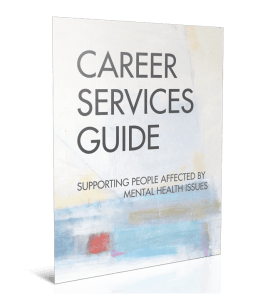
CERIC has agreed to fund the development of a web-based training manual for career service workers that will: improve employment and educational outcomes for people living with mental health issues by enhancing the knowledge, skills, abilities, recovery beliefs and improving practice policies of Canada’s mainstream career service workers. Training materials will be developed drawing on expert advice from leading organizations and by building on best practices in mental health, peer support, recovery and employment. People living with mental health issues will provide important experiential expertise. First-person videos, from diverse perspectives will bring key messages and training content to life.


Why is this project important? Because employment is a critical cornerstone of social inclusion, yet people living with mental illness face the highest unemployment rate of any disability group. Although people want to and are able to work, employment for many remains an illusive goal. Career service workers (CSWs) are a critical resource in supporting clients in meeting their full employment potential. To better understand the training needs of career practitioners CERIC-funded Charting the Course: Mapping the Career Practitioner Role in Supporting People with Mental Health Challenges. Through regional focus groups, multi-sector stakeholder roundtables, meetings with career resource centre managers, presentations at provincial and national career planning conferences the challenges people face were identified including:
- Increasing numbers of clients are disclosing mental illness as a factor in their employment.
- CSWs feel hampered by a lack of knowledge and the skills needed to support these clients.
- Clients may not feel CSWs have the knowledge and skills they need to help them.
- Both CSW and clients acknowledge stigma and discrimination as a barrier to accessing services.
- Reduced access to career planning services negatively impacts employment prospects.
- CSWs are motivated to improve their knowledge and skills and want targeted training tools.
Project partners in the toolkit development process include: CERIC, Nova Scotia Career Development Association, Canadian Mental Health Association – National, Psychosocial Rehabilitation Canada, Great-West Life Centre for Mental Health in the Workplace, Mental Health Commission of Canada (approval pending), and the Healthy Minds Cooperative and Nova Scotia Certified Peer Support Specialist Program.
To learn more about this project visit: http://chartingthecourse.nscda.ca/. If you are interested in getting involved, please send an email to: Neasa Martin, neasamartin@primus.ca.
The Career Services Guide for Supporting People Affected by Mental Health Issues is now available.
Final Report – Learn about the experience of the project partner in delivering this project with key findings and insights.
